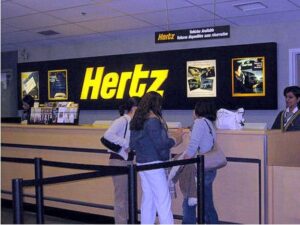
Hertz filed Chapter 11 bankruptcy providing the auto industry one more challenge to deal with during the pandemic.
The economic crisis created by the coronavirus pandemic has claimed its first transportation industry casualty, rental car giant Hertz – but the impact is likely to be felt by numerous automakers, as well as U.S. used car buyers.
Hertz Global Holdings Inc., the owner of numerous rental-car brands, including Hertz, Dollar and Thrifty, on Friday filed under Chapter 11 in the U.S. Bankruptcy Court for the District of Delaware, giving it a chance to reorganize under the supervision of a bankruptcy judge. Hertz said in its filing it held assets of nearly $26 billion but also had debts of more than $24 billion.
Hertz and its investors and debtholders aren’t the only ones who are expected to be impacted by the bankruptcy filing. The long-time rental industry giant plans to effectively halt the purchase of new cars and light trucks for the foreseeable future, a move that will contribute to the sharp decline in the American market this year.
(Rental car companies slash order, deliver another blow to auto industry.)
“We’re not going to be shipping cars to rental fleets for some time,” Mark LaNeve, Ford’s head of sales, services and marketing for North America, told TheDetroitBureau.com, noting that Hertz rivals such as Avis and Enterprise also are curtailing new vehicle orders, instead planning to continue using vehicles already in their fleets.

Business at rental car agencies is down significantly, cutting the need for new vehicles from automakers — and leading to the Ch. 11 filing by Hertz.
One uncertainty is how the bankruptcy filing will impact the used-car market. By slashing new car orders, Hertz could reduce the amount of near-new products flowing back onto dealer lots in the year or so ahead. On the other hand, the company may face pressure from its debtholders to quickly sell off a chunk of its existing fleet, according to some reports. That could upset the balance in the used-car market in the U.S. which has already seen declining demand and a sharp tumble in prices.
Hertz, which filed for bankruptcy just before it was required to make a payment on notes held by a key creditor, said in a press release that the impact of COVID-19 on travel demand was “sudden and dramatic,” causing an abrupt decline in the company’s current and future bookings.
“Hertz took immediate actions to prioritize the health and safety of employees and customers, eliminate all non-essential spending and preserve liquidity. However, uncertainty remains as to when revenue will return and when the used-car market will fully re-open for sales, which necessitated today’s action,” the statement said.
Hertz’s bankruptcy filing was limited to operations in the U.S. and Canada. Operating regions including Europe, Australia and New Zealand were not included. In addition, Hertz’s franchised locations, which are not owned by the company, also are not covered by the Chapter 11 proceedings.
“Hertz has over a century of industry leadership and we entered 2020 with strong revenue and earnings momentum,” Hertz President and CEO Paul Stone said in the company’s statement. “With

Mark LaNeve, Ford’s North American head of sales and marketing, said the company wouldn’t “shipping cars to rental fleets for some time.”
the severity of the COVID-19 impact on our business, and the uncertainty of when travel and the economy will rebound, we need to take further steps to weather a potentially prolonged recovery.”
(Collapsing auto sales, earnings raise talk of bailout – or sales stimulus – program.)
All of Hertz’s businesses in the U.S. and abroad, including its Hertz, Dollar, Thrifty, Firefly, Hertz Car Sales, and Donlen subsidiaries, remain open and serving customers. All reservations, promotional offers, vouchers, and customer and loyalty programs, including rewards points, are expected to continue as usual, Hertz said in its statement.
The collapse in air travel had been particularly damaging for Hertz, which throughout the years had developed a business model that relied heavily on business and vacation travelers, who flew to their destination and then rented a vehicle to complete their journey.
Hertz, with its diversified fleet of rental vehicles, has been a major customer for automakers in North America. The fleet market accounts for about 30% of new vehicles sale in the U.S. with the bulk of that demand going to rental companies. Under their traditional model they hold onto those vehicles for anywhere from four to 22 months, according to industry data, with the average running about 13 months.
One of the questions raised by the bankruptcy is what Hertz will do with its vast fleet of vehicles. One possibility would be for it to maintain what it currently holds on its U.S. and Canadian lots and try to keep them running longer. That would sharply reduce the number of used vehicles available in the months ahead. But that is just one of the alternatives.
The financial news website Seeking Alpha noted the Hertz bankruptcy had to the potential “to make a royal mess of used-vehicle wholesale prices, as creditors may take possession of their collateral and dump hundreds of thousands of vehicles on the wholesale market starting in late July, pushing down wholesale prices further and creating further valuation pressures and bigger losses for Hertz creditors, the entire rental car industry, and leasing companies that also have to dispose of their vehicles.”
The lower valuation on used vehicles also would force auto finance companies, such as Ford Motor Credit and GM Financial and Ally Bank to lower the value of leases on their books.
(GM pulls the plug on Maven car-sharing service.)
Automobile leases are linked to the value on the vehicles at a future auctions and lower lease value could raise the cost of leasing generally, putting downward pressure on sales and production of new models.
(Paul A. Eisenstein contributed to this report.)

